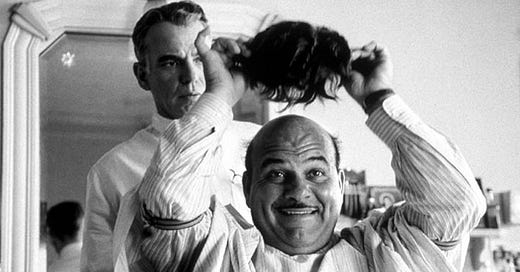Heroes of the Zeroes: The Man Who Wasn't There
Heroes of the Zeroes is a daily, alphabetical look back at the 365 best films of 2000-2009.
"The Man Who Wasn't There" Rated R 2001
The Coen Brothers have long shown crack timing for cosmic jokes about life’s general disappointment. In 2001’s “The Man Who Wasn’t There,” they breeze through a barber’s banal life with visual panache, prickly wit and some of their most swooning gestures in their career-long love affair with the English language.
Spinning barber poles always create the same image, much like the turning world of taciturn Ed Crane (Billy Bob Thornton). Ed’s misanthropy has settled into a joyless marriage to Doris (Frances McDormand). Hell, his life’s work kills what’s meant to grow. (Only the Coens could fuse existentialism with hair.) After attempted blackmail backfires, Ed’s life collapses into criminal behavior.
Thornton’s sourpuss face and countenance are built for black-and-white, and cinematographer Roger Deakins renders sunlight an expressive expose — one scene forming a sort of cell out of shadows and sunshine. Meanwhile, Jon Polito’s spastic, sweaty shyster, Tony Shalhoub’s fast-talking attorney and a bit of UFO theorizing offer the Coens’ usual wacky grace notes.
But it’s the Franz Kafka fatalism and motif of Heisenberg’s uncertainty principle that make “Man” singularly strange on the Coens’ resume. That principle suggests looking at something changes its properties. By envisioning escape, Ed binds himself more firmly to misery.
The principle holds for “Man,” too; few outside of Coen cliques paid this nihilistic neo-noir much attention. Perhaps that’s the Coens’ wryest, slyest punchline: To watch Ed Crane is to largely forget him and, upon returning to him, revisit the pleasures of meeting him for the first time.



